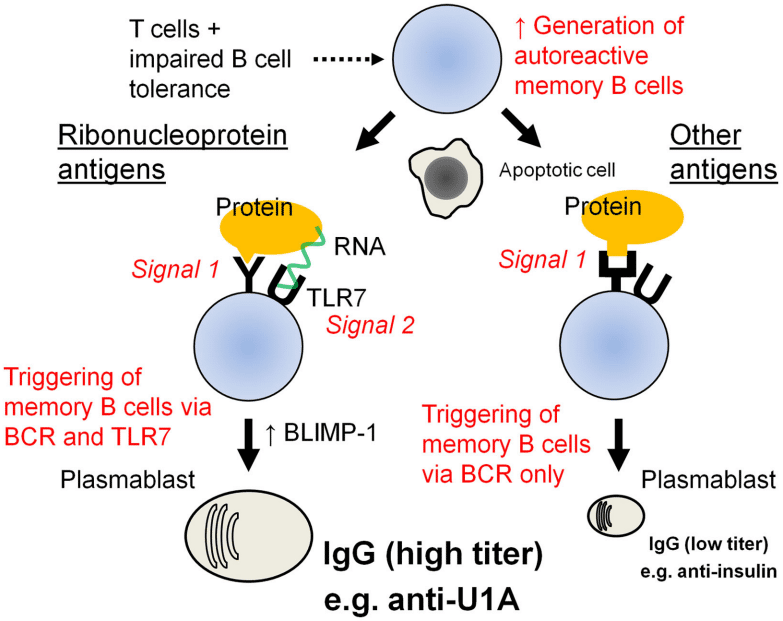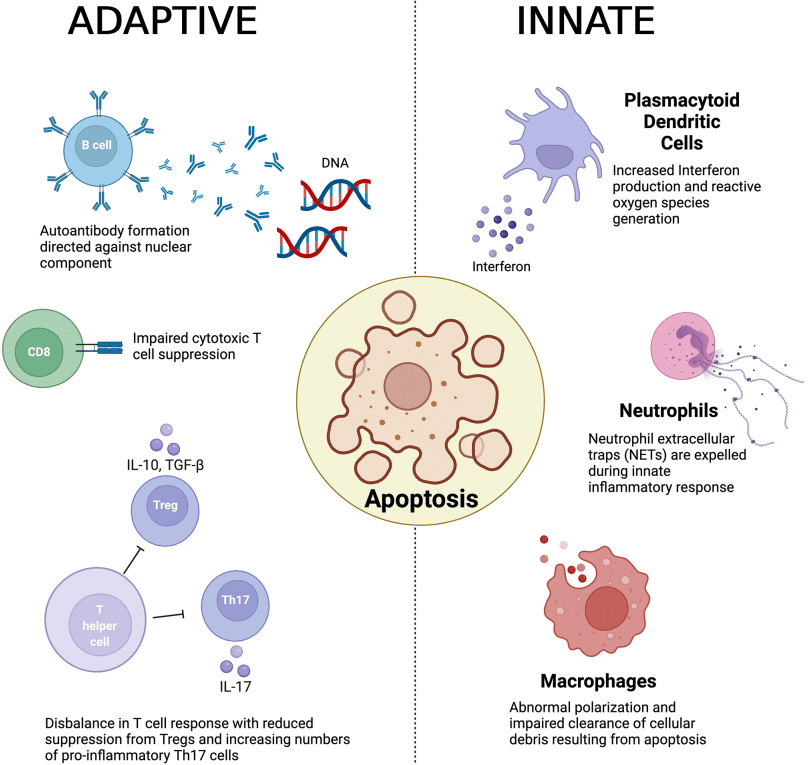NAA and Systemic Lupus Erythematosus
Natural autoantibodies (NAA) are closely related to the pathogenesis and treatment of systemic lupus erythematosus (SLE). Creative Biolabs is a leading provider of NAA testing and analysis services. We have a team of experienced professionals and an advanced technology platform to provide a full range of NAA services for SLE research.
Description of SLE
SLE is the prototypical systemic autoimmune disease with significant disease. It's characterized by a global loss of self-tolerance with activation of autoreactive T and B cells leading to the production of pathogenic autoantibodies and tissue injury. SLE affects the joints, skin, and blood in over 80% of patients and the kidneys, central nervous system, and cardiopulmonary system in 30%-50% of patients. The primary pathological findings in patients with SLE are those of inflammation, vasculitis, immune complex deposition, and vasculopathy. Immune complexes comprising autoantibody and self-antigen are deposited particularly in the renal glomeruli and mediate a systemic inflammatory response by activating complement or via FcγR-mediated neutrophil and macrophage activation. Activation of complement (C5) results in damage through the formation of membrane attack complex (C5B-9) or the production of allergic toxin and cell activator C5a. Neutrophils and macrophages cause tissue injury by the release of oxidants and proteases.
 Fig.1 Proposed model of autoantibody production in SLE.1
Fig.1 Proposed model of autoantibody production in SLE.1
Pathway of SLE
The loss of tolerance to self and the subsequent elevation in serum ANA levels is proposed to be a crucial first step in the development of SLE. The B cells produced are mostly self-reactive and are usually cleared by central tolerance mechanisms in the bone marrow, including receptor editing, deletion, or induced incompetence. These are intrinsic B cell mechanisms that are known to be controlled by B cell antigen receptor signaling thresholds and regulators of the phosphoinositol 3 kinase pathway. In addition, the generation of newborn autoreactive B cells occurs after maturity as a result of somatic high mutations in germinal centers (GCs). It is thought that most of the pathogenic autoantibodies are somatic highly mutated, type-switching IgGs. TA T-box transcription factors (T-BET) also contribute to the production of pathogenic autoantibodies. TLR7 in B cells is also required for spontaneous GC formation and antibody production.
Other mechanisms that may contribute to ANA production include molecular simulation. Similar to B lymphocytes, T cells have a tolerance mechanism that inhibits their own reactivity. Multiple autoimmune-prone strains have demonstrated a requirement for both B and CD4+ T cells for the production of IgG autoantibodies, indicating that loss of T-cell tolerance may play a role in lupus. In SLE, abnormalities in the proximal signaling pathway can lead to changes in T cell tolerance and reactivity. Tfh cells are important for the activation and selection of B cells in GCs. Interestingly, 3 years prior to diagnosis of SLE serum levels of IFN-γ, IL-5 and IL-6 were higher, suggesting their importance in the development of the disease.
 Fig.2 The main immunological abnormalities associated with the pathology of SLE.2
Fig.2 The main immunological abnormalities associated with the pathology of SLE.2
NAA Services for SLE at Creative Biolabs
- NAA Services for Anti-Nuclear Antibody (ANA)
- NAA Services for Anti-Double-Stranded DNA (dsDNA)
- NAA Services for Anti-Ribonucleoprotein (RNP)
- NAA Services for Anti-Ro Autoantibodies
- NAA Services for Anti-La Autoantibodies
- NAA Services for Rheumatoid Factor (RF)
- NAA Services for Anti-C3
- NAA Services for Anti-C4
- NAA Services for Anti-C1q
- NAA Services for Anti-Smith
- NAA Services for Anti-cardiolipin Antibody
- NAA Services for Anti-Native DNA
SLE Related Products at Creative Biolabs
| Target | Product Name | Cat. No. |
|---|---|---|
| dsDNA autoantibody | Human dsDNA Autoantibody (IgG) ELISA kit | NAK-035 |
| dsDNA autoantibody | Human dsDNA Autoantibody (IgG&IgM&IgA) ELISA kit | NAK-036 |
| SS-A 60 autoantibody | Human SS-A 60 Autoantibody (IgG) ELISA kit | NAK-060 |
| SS-A autoantibody | Human SS-A Autoantibody (IgG) ELISA kit | NAK-061 |
| SSB autoantibody | Human SSB Autoantibody (IgG) ELISA kit | NAK-007 |
| RNP/Sm autoantibody | Human RNP/Sm Autoantibody (IgG) ELISA kit | NAK-057 |
| Sm autoantibody | Human Sm Autoantibody (IgG) ELISA kit | NAK-059 |
| RNP 70 autoantibody | Human RNP 70 Autoantibody (IgG) ELISA kit | NAK-056 |
| SS-A (Ro), SS-B (La), Sm and RNP/Sm autoantibody | Human SS-A (Ro), SS-B (La), Sm, and RNP/Sm Autoantibody (IgG) ELISA kit | NAK-039 |
| SS-A (Ro), SS-B (La), Sm RNP/Sm, Scl-70, and Jo-1 autoantibody | Human SS-A (Ro), SS-B (La), Sm RNP/Sm, Scl-70, and Jo-1 Autoantibody (IgG) ELISA kit | NAK-040 |
| Cardiolipin, Phosphatidyl Serine, Phosphatidyl Inositol and Phosphatidic acid autoantibody | Human Cardiolipin, Phosphatidyl Serine, Phosphatidyl Inositol and Phosphatidic acid Autoantibody (IgG&IgM ) ELISA kit | NAK-053 |
As one of the largest NAA services and products suppliers, Creative Biolabs has expertise and capabilities in providing high-quality NAA solutions. At Creative Biolabs, we challenge ourselves to think out of the box and innovate. You can count on us for all your NAA needs, we promise to deliver. If you are interested in our NAA services and products, please contact us for more information.
References
- Han, Shuhong, et al. "Mechanisms of autoantibody production in systemic lupus erythematosus." Frontiers in immunology 6 (2015): 228.
- Robinson, George Anthony, Meredyth G. Ll Wilkinson, and Chris Wincup. "The role of immunometabolism in the pathogenesis of systemic lupus erythematosus." Frontiers in Immunology 12 (2022): 806560.

